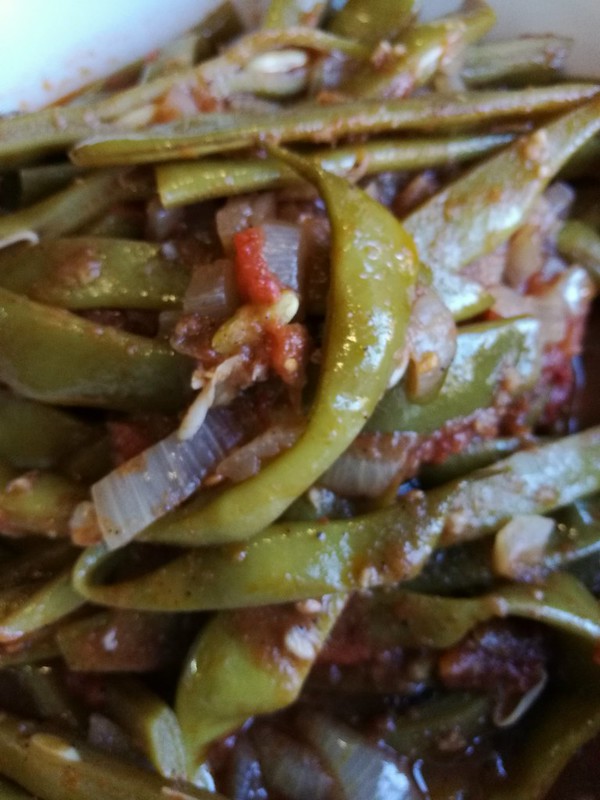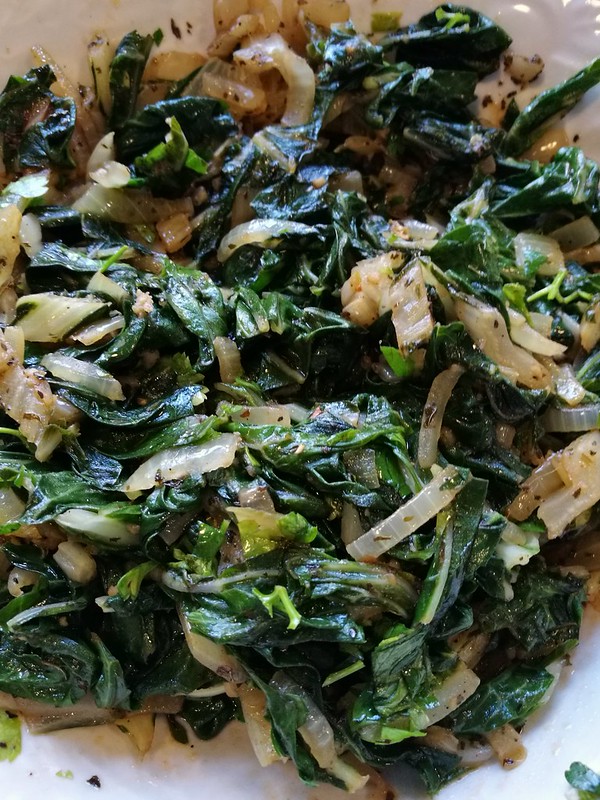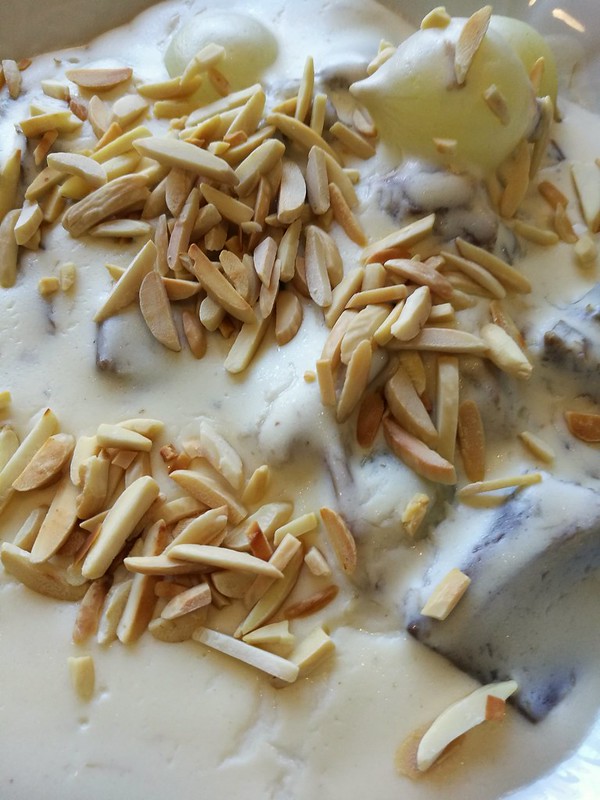I bought this book on sale a while ago, while the worst of the Syrian civil war (no war is ever civil) was happening, and as some of the profits were going towards refugees who had fled Syria, I was happy to get it. The Aleppo Cookbook: Celebrating the Legendary Cuisine of Syria by Marlene Matar, is the most honest cookbook I have ever purchased and cooked from.
That sentence probably doesn’t mean what you think it means. This cookbook takes the regular food of regular people and puts it into a cookbook. These are not the gourmet recipes of the elite or fancy tourist restaurants. These are recipes that use common ingredients, acknowledges that meat will often need to be cooked slowly and with tenderisers like vinegar, and that simple food is often very tasty and flavoursome. I really enjoyed cooking from this book. My only critique was that there might have been a bit too much liquid in the freekeh pilaf, but that’s pretty much it. Four and a half stars out of five.
Freekeh Pilaf
Ingredients
- 1/4 cup olice oil
- 1 cup chopped onion
- 2 cups freekeh
- 1 tsp allspice
- 1 tsp cinnamon
- 1/2 tsp ground black pepper
- 1 tsp salt (or to taste)
- 1 litre of beef, chicken or vegetable stock
Method
- Heat the olive oil over medium to low heat and fry the onion until light golden in colour. Add the freekeh, allspice, cinnamon, black pepper and salt. Continue frying for a few seconds.
- Pour in the stock and bring to the boil. Lower the heat, cover the pot, and gently simmer for about 45 minutes – 1 hour, stirring a few times after about 20 minutes.
- Check the freekeh – if it needs more cooking time, stir in about 1/4 of a cup of hot stock and simmer, covered, for around 10 more minutes. Taste and adjust seasoning.
- Remove from the heat and replace the lid, covering it with a thick towel to keep the heat in. Set aside for 30 minutes.
- Spoon onto a serving platter and serve.
Notes on this recipe
- Just remember that freekeh is actually chewy. It is also really nice. I do like a good freekeh recipe, and this is one of them.
- This pared really well with the other dishes we cooked.
Green Beans in Oil
Ingredients
- 1kg of romano beans (or any wide, flat green bean)
- 1/3 cup olive oil
- 1 cup thinly sliced onion
- 5 garlic cloves, crushed
- 3 tbsp tomato paste (if using fresh tomatoes)
- 1 tbsp red pepper paste (optional)
- 1 1/2 tsp ground allspice
- 2 tsp ground coriander
- 1/2 tsp ground black pepper
- 1 tsp sugar
- 2 tsp salt
- 1kg ripe tomatoes, peeled and chopped OR 800g can chopped tomatoes
Method
- Wash the beans, then snap off the ends using your fingers, and remove any stringy threads than run along the length of the beans. Cut the beans in half lengthways.
- Heat the olive oil in a pot and fry the onions briefly over medium heat. Add crushed garlic, tomato paste (if using), red pepper paste, allspice, coriander, black pepper, sugar and salt, and fry for a few seconds more.
- Mix in the chopped tomatoes and green beans. If using canned tomatoes, add 3/4 cup water. Stir the mixture and let it come to the boil.
- Lower the heat to very low, cover the pot, and simmer gently for 35 minutes or until the beans are tender. Taste and adjust the seasoning. Serve warm or cold.
Notes on this recipe
- I halved this recipe and it comfortably fed 6 people as a side dish/one of several dishes.
- I had never cooked with beans like this before, and it was great. I’m growing some in my garden so I now have a recipe for them.
Fried Swiss Chard
Ingredients
- 750g Swiss chard/silverbeet
- 1/3 cup olive oil
- 1.5 cups finely chopped onions
- 4 garlic cloves, crushed
- 1 tbsp red pepper paste (OR tomato paste with a pinch of cayenne pepper)
- 1 tbsp dried mint
- Dash ground black pepper
- 1 tsp salt or to taste
- 1/2 cup finely chopped parsley
- lemon slices
Method
- Wash and dry the Swiss chard, and separate the leaves from the stems. Remove the threads that cling to the stems: with a small knife, cut away a slice of the stem and pull the threads along the length of the stem. Repeat from the other side as necessary.
- Chop the stems crosswise into thin slices.
- Cut the leaves in half lengthwise, if large, and chop into 2cm pieces.
- Place the olive oil in a medium sized pot and fry the onions over medium to low heat until tender. Add the garlic and saute for a few more seconds.
- Raise the heat, add the Swiss chard stems, and saute for 4 minutes, stirring. Add the leaves and continue to stir until most of the liquid has evaporated.
- Stir in the red pepper paste, dried mint, and black pepper and saute for a further minute. Taste and add the salt.
- Remove the pot from the heat and mix in the chopped parsley.
- Spoon onto a serving platter and serve cold with lemon slices and Arabic flatbread.
Notes on this recipe
- We served this warm with the freekeh.
- I still don’t like silverbeet. Those who do like it (there were three at the table), said the dish was tasty and tasted mostly of mint. I tasted it, it tasted mostly of silverbeet.
Lamb shanks and onions in yoghurt sauce
Ingredients
- 800g lamb shanks with bones
- 450g baby onions, unpeeled
- 1kg sheep’s, goat’s or cow’s milk yoghurt
- 1/4 cup cornstarch (cornflour) mixed with 1/4 cup water (if using cow’s milk yoghurt)
- 1 egg white
- 1.5 tsp salt
Aromatics
- 2 – 3 cinnamon sticks
- 1 bay leaf
- 1 medium onion, quartered
- 1 small carrot, chopped (optional)
- 1/2 tsp salt, or to taste
To garnish
- 1 tbsp fried pine nuts
Method
- Place the meat in a large cooking pot with cold water to cover by about 5cm. Bring to a boil over high heat, skimming the foam that forms on the surface. Add the aromatics, cover the pot, and simmer very gently (the surface of the liquid should barely tremble) for 35 minutes – 1.5 hours, or until the meat is very tender. Remove the meat and set aside, discarding the bones.
- Strain and measure the stock and return it to the pot. Boil, uncovered, until it is reduced to about 1 cup.
- Blanch the onions for 1 – 2 minutes in boiling water, drain and transfer to cold water for a few seconds. Drain and peel the onions, leaving part of the root end intact to keep them whole.
- Place the onions in a small pot with water to cover and bring to a boil. Lower the heat and cook for about 10 minutes, or until almost tender. Drain.
- Place the yoghurt in a large bowl and whisk well. If using cow’s milk yoghurt, stir in the cornstarch-water mixture. Add the meat stock, egg white and salt. Pass through a fine mesh strainer into a medium-size pot.
- Place the pot over medium heat and stir continuously a wooden spoon, always in one direction, until the mixture comes to a boil. Taste and adjust seasoning.
- Add the meat and onions. Return to a boil, lower the heat, and simmer briefly until the meat is heated through. Garnish with the pine nuts, if using, and serve hot.
Notes on this recipe
- This was quite tasty, though time consuming. In order to ensure the meat was as tender as possible, we opted for the longer cooking time, which I think is more reasonable to get tender meat.
- Figuring out how long it takes to reduce the stock to about 1 cup is also tricky. It’s about an hour, and at that point we gave up, measured out the cup (there was probably about a cup and a half), and discarded the remainder.
- I also used, as you can see, slivered almonds instead of pine nuts. I like pine nuts, but cannot ethically use them while they are adding to deforestation.





Recent Comments